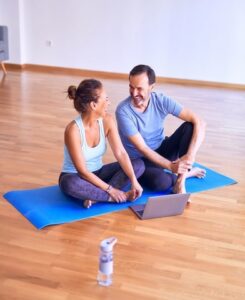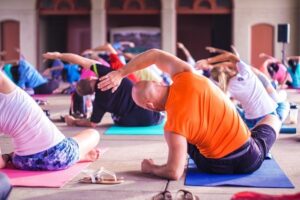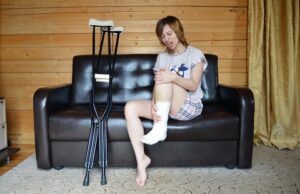 How many times have I heard a client say, “It sucks getting old!”? Usually, the statement follows a patient’s full account of his or her many physical ailments, apparently as a way to rationalize the perception of being physically “a mess”. But life should get better as we get older, not worse. We have more experience, more wisdom, and more gratitude. Life only sucks as we get older under one condition: when our health deteriorates.
How many times have I heard a client say, “It sucks getting old!”? Usually, the statement follows a patient’s full account of his or her many physical ailments, apparently as a way to rationalize the perception of being physically “a mess”. But life should get better as we get older, not worse. We have more experience, more wisdom, and more gratitude. Life only sucks as we get older under one condition: when our health deteriorates.
The first thing most aging people notice is a breakdown in their aesthetics – that is, the way they look. As we age, the wear-and-tear of living can lead to wrinkles, crooked teeth, graying hair, and sagging skin. Many people increase in size, and they get soft, literally. Of course, this is distressing to many, and as a result, the anti-aging industry has flourished. Creams, lotions, and Botox for wrinkles. Invisalign to straighten teeth. Coloring and hair transplants to battle graying and balding. And plastic surgery for everything from sagging skin to fat removal to bigger boobs to fuller lips. Nothing wrong with any of these treatments to combat the diminishing aesthetics of aging. Obviously, the more one does, the more noticeable it will be to others. On some it looks good, and on others it’s debatable, but nonetheless, we are fortunate to have such a vast number of products and procedures to help us maintain our looks.
Aesthetics: How You Look
Just understand that there are many things you can do, naturally, to maintain your aesthetic appearance. Drinking ample water is essential to skin health (along with many other internal environment benefits). Eating whole, natural foods and avoiding processed foods, fast foods, and foods laden with sugar is absolutely vital in maintaining your looks over time. Supplementing with high quality vitamins will also go a long way in keeping you looking vibrant – vitamins B, C, D and essential fatty acids, among others, for your best aesthetic enhancers. And regular exercise is a must for maintaining your overall appearance. Your body from the neck down goes a long way as an attractive factor. While some become obsessed with their facial appearance, your body shape and size are noticed by most people immediately; and frankly, your face will always look more attractive when slim and healthy from exercise. And finally, you simply cannot ignore getting sufficient rest. Sleep is essential to so many aspects of health including your brain, immune function, and wound healing. Skimp on the sleep and it shows in your face first, then over time, the rest of your body and mind. Sleep, exercise, good food, high quality vitamin supplements, and plentiful water are the keys to natural anti-aging.
Aches and Pains: How You Feel
 The next thing that happens to people as they age is that many develop conditions which lead to aches and pains. Some of these conditions are simply excesses and deficiencies of actions and behaviors. For example, not exercising is a deficiency that commonly leads to pain. I am surprised at how many people are unaware of this. Not moving regularly, in a challenging manner (that is, not simply grocery shopping, window shopping, or walking around the mall), is one of the biggest sources of spontaneously emerging aches and pain in people. Back pain, neck pain, arm and leg pain, and joint pain like in the elbows, knees and hips often have no specific injury but are simply due to lack of movement. Conversely, excessive activity can also cause pain – something my athletic clients often ignore. Obviously, overuse injuries exist; however, I am not talking about those here. I am talking about overworked muscles, joints, and limbs. Exercising excessively, or not being mindful of form while working out, or even playing sports on only a few days rest can all lead to overuse aches and pains.
The next thing that happens to people as they age is that many develop conditions which lead to aches and pains. Some of these conditions are simply excesses and deficiencies of actions and behaviors. For example, not exercising is a deficiency that commonly leads to pain. I am surprised at how many people are unaware of this. Not moving regularly, in a challenging manner (that is, not simply grocery shopping, window shopping, or walking around the mall), is one of the biggest sources of spontaneously emerging aches and pain in people. Back pain, neck pain, arm and leg pain, and joint pain like in the elbows, knees and hips often have no specific injury but are simply due to lack of movement. Conversely, excessive activity can also cause pain – something my athletic clients often ignore. Obviously, overuse injuries exist; however, I am not talking about those here. I am talking about overworked muscles, joints, and limbs. Exercising excessively, or not being mindful of form while working out, or even playing sports on only a few days rest can all lead to overuse aches and pains.
Aches and pains are probably the most common reason people feel old. While wrinkles and graying hair may make one look older, pain is what actually makes people feel old. And it is this element which truly makes people feel that it sucks to get old. However, if you can alleviate your pain, naturally, without a reliance on drugs or surgery, then you can most certainly retain a feeling of youth and vibrancy in your day-to-day living. Adding drug reliance to painful conditions really can cause you to feel old and worn down. Drugs have side effects, like making you feel tired, clouded thinking, forgetfulness, and many others. This combination of pain and drugs is the great ager. Fortunately, there are natural solutions to pain relief, but you will have to be committed and patient. Depending on how chronic your pain condition, it could take time and a lot of work initially. But stay with it. I promise if you keep working at ridding yourself of pain (with professional help where needed), you will succeed.
But I can tell you that in twenty-two years in the natural health business, I have observed that patience is the hardest thing for people to follow. This is somewhat understandable, as few people enjoy being in pain. While drugs and surgery offer quick fixes, but I can tell you, again from over two decades experience, there is no reality in a quick fix. My clients who have opted for surgery, at best, feel better for a short time and then are back in pain again later. Sometimes it is the same pain, sometimes a different but related pain due to the added invasive nature of surgery. You do not have to believe me although I hope you will. You can test what I have just said but unfortunately, I tell you, there is no turning back once you go under the knife. Some folks need the surgery, no doubt, I support those situations. But many people do indeed seek a quick fix, and it just does not exist. In the end, it’s the pain that makes the sufferer feel old; and with enough pain, some added drugs, and a surgery or two, anybody will look and feel old.
Body Rehabilitation: How You Function
 Along with pain is disability. If a person suffers pain, not a spontaneous emerging pain, but one due to injury, it is not uncommon for that situation to lead to a loss of normal function. Sprained ankles, torn ligaments, hip degeneration, labral tears, tendon ruptures, and spinal conditions like herniated discs can all cause long term disability. It is probably not hard to imagine how limping around, difficulty bending forward, the inability to lift moderately heavy objects, difficulty raising one’s arms above one’s head, and numbness and tingling in the hands and fingers could make somebody feel very old. Unfortunately, injuries can be difficult to treat, may take long to heal completely, may have many exacerbations and recurrences, and may prevent you from exercising, leading to further pain and disability. However, the good news is: All injuries are treatable. Again, you just need dedication, commitment, and patience. A good doctor (physical health practitioner) can help minimize setbacks and increase successful healing. But still, it may take time and effort. These are situations which can easily lead one to seek a quick remedy (drugs, surgery). And, of course, surgery may especially be necessary in these situations. Torn ligaments, rupture tendons, and severe disc herniations all need the help of a good surgeon. But many injuries are treatable conservatively; and in my opinion, conservative treatment is always best when an option. Disability, without a doubt, is an aging increaser, but getting your injury treated and rehabilitating yourself will return a pep in your step and bring back some youth and vigor. Heck, you might even be able to run around like kid if you do take care of yourself the right way.
Along with pain is disability. If a person suffers pain, not a spontaneous emerging pain, but one due to injury, it is not uncommon for that situation to lead to a loss of normal function. Sprained ankles, torn ligaments, hip degeneration, labral tears, tendon ruptures, and spinal conditions like herniated discs can all cause long term disability. It is probably not hard to imagine how limping around, difficulty bending forward, the inability to lift moderately heavy objects, difficulty raising one’s arms above one’s head, and numbness and tingling in the hands and fingers could make somebody feel very old. Unfortunately, injuries can be difficult to treat, may take long to heal completely, may have many exacerbations and recurrences, and may prevent you from exercising, leading to further pain and disability. However, the good news is: All injuries are treatable. Again, you just need dedication, commitment, and patience. A good doctor (physical health practitioner) can help minimize setbacks and increase successful healing. But still, it may take time and effort. These are situations which can easily lead one to seek a quick remedy (drugs, surgery). And, of course, surgery may especially be necessary in these situations. Torn ligaments, rupture tendons, and severe disc herniations all need the help of a good surgeon. But many injuries are treatable conservatively; and in my opinion, conservative treatment is always best when an option. Disability, without a doubt, is an aging increaser, but getting your injury treated and rehabilitating yourself will return a pep in your step and bring back some youth and vigor. Heck, you might even be able to run around like kid if you do take care of yourself the right way.
Getting older definitely does not suck. You have enough growth and evolution behind you to truly understand what is meaningful in life. You have more confidence, and less worries about what others think of you. Hopefully, you have enough humility to resolve conflicts with your closest loved ones. Things only get (and stay) bad when you feel bad physically – THIS is what makes you feel older: It makes you feel broken down. The more you can offset this breakdown, the more you will be able to enjoy your golden years. This requires work on your part. It won’t come without your commitment, and it won’t come without action. But if you invest in yourself by doing the right things, you will have the greatest probability of looking your best and feeling your best. That should be worth the effort and I know you will see it that way, too, in the end.

**If you want the definitive guide to healthy life-enhancing behaviors, pick up a copy of The Six Keys to Optimal Health today.
















